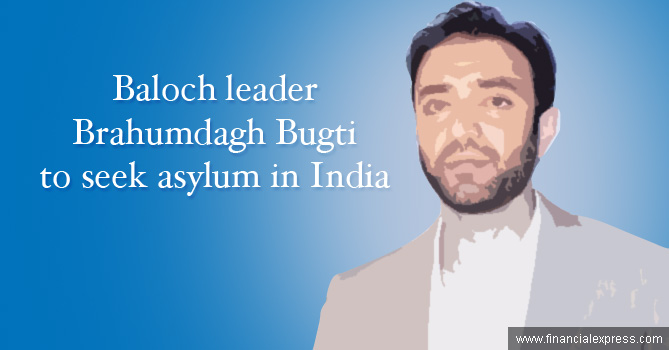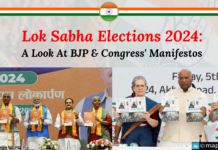Baloch leader, Brahumdagh Bugti, grandson of Nawab Akbar Bugti, has decided to seek political asylum in India. President of Baloch Republican Party (BRP), and head of the Bugtis — the largest tribe of Balochistan, Brahumdagh Bugti has been residing in Geneva under his Afghan passport since he fled Balochistan in 2006 after the assassination of his grandfather in 2006, during the presidency of General Pervez Musharraf. However, he is forbidden to engage in political activities while in Switzerland.
The decision to initiate legal proceedings for fulfilling the asylum procedure with the Indian Government was arrived at after a meeting of BRP, which examined and cleared the need to shift to India. Azizullah Bugti, a spokesperson of the BRP stated, “Baloch Republican Party’s Central Committee has ratified Mr. Bugti’s decision to seek political asylum in India. At the moment, we are concerned about the safety of the president of the party and that is why the decision for political asylum was cleared. We have not yet decided who all will accompany him on his journey to India, but that is up to him to decide and the party will volunteer members to accompany him to India as the need arises.”
Earlier this month, Bugti had expressed his desire for India’s support in his quest for the independence of his homeland from Pakistan. Citing examples of the support extended to Dalai Lama and Sheikh Mujibur Rahman, Bugti hoped that India would extend the same support when the need arose.
Know More About The Province of Balochistan
Balochistan constitutes of one of the four provinces of Pakistan. With an area covering 44% of the total area, which is nearly half of Pakistan, Balochistan is the largest province in the country, and has a population of 1.3 crore, constituting only 7% of the total population of Pakistan. Here are a few things you should know to understand the ongoing problem in Balochistan.
- Balochistan is strategically located and has shared borders with Punjab, Sindh, FATA, as well as Afghanistan and Iran.
- Balochistan is also home to the Gwadar Port, which is of immense importance to Pakistan.
- The land itself is very rich in natural resources including oil, gas, copper and gold; the economy is dominated by its natural gas fields.
- The inhabitants of Balochistan mainly consist of the tribese Baloch, Pashtuns and Brahuis.
- The people of Baloch are ethnically, culturally and socially different from the rest of Pakistan and feel dominated at the hands of the Punjabis.
- Though mineral rich, the province is poor and very backward even today.
- Pre-Independence, the land of Baloch was divided into 4 princely states.
- When Pakistan was born in 1947, the princely states refused to join the new nation.
- Pakistan forcefully annexed Balochistan in March 1948.
- Though the ruler then, Yar Khan signed a treaty of accession, his brothers and followers continued to fight this accession, which saw five waves of insurgencies in 1958, 1962-63, and 1973-77.
- Violent campaigns were held to gain independence from Pakistan.
- Post 1977, peace reigned for 2 decades; tensions started building up after General Pervez Musharraf seized power in 1999.
- The military, under the leadership of Musharraf, started building new cantonments in Balochistan.
- This move by the military was seen as a bid to tighten control over the province by the radical nationalist factions.
- This time the fifth wave of insurgency erupted and it still continues to be on.
- Of the radical nationalist factions, Balochistan Liberation Army (BLA), led by Brahumdagh Bugti, is the strongest and has been designated as a terrorist group by Pakistan with claims that India is backing BLA.
- The BLA has conducted several attacks on the Pakistani security forces and civilians over the years in retaliation of Pakistani atrocities, the bid of Pakistan to keep the Baloch suppressed.
- Pakistani security forces are accused of detaining 19,000 men, women and children over the past 2 decades illegally and many of the detained have been raped and killed.
- The Pakistani atrocities in the province had attracted international condemnation. “The surge in unlawful killings of suspected militants and opposition figures in Balochistan has taken the brutality in the province to an unprecedented level,” said Brad Adams, Asia Director at Human Rights Watch, in a July 2011 report.
Pakistan’s Interest in Balochistan
Balochistan adds up to 44% of the total area of Pakistan. While Pakistan cannot think of giving up nearly 50% of its land, it also has further vested interests in the province.
- Balochistan holds a position of great importance in Pakistan’s future economic and geopolitical strategies.
- The province is one of the important locations in the proposed economic corridor at an investment of $46 billion by China, which aims to link the deepwater port of Gwadar with the city of Kashgar, a trading hub in the western Chinese region of Xinjiang.
- The proposed Iran-Pakistan gas pipeline is also planned to go through Balochistan.
India’s Stand on the Issue
In spite of Pakistan’s interference with Kashmir ever since independence, India had maintained a distance from the Balochistan issue at any international platform. However, Pakistan has always maintained that India is helping the BLA in its alleged terrorist activities and also helping the Baloch nationalists.
Things took a turn in the offensive mode as far as India was concerned when in retaliation to Prime Minister Nawaz Sharif’s inclusion of the Kashmir issue in his Independence Day speech, Prime Minister Narendra Modi became the first Prime Minister in the world to speak of Balochistan and its sufferings, and without mentioning Pakistan, thanked the people of Balochistan from the ramparts of the Red Fort in his Independence Day speech.
Yes, this time India hit Pakistan where it hurts the most. Modi’s government followed this up by raising the issue in the United Nations recently. Speaking at the 33rd Session of the U.N. Human Rights Council in Geneva, India Ambassador and Permanent Representative at the U.N. in Geneva, Ajit Kumar said, “While India’s credentials as a peaceful, democratic, pluralistic society that is deeply committed to the welfare of its people were well established, Pakistan is characterised by authoritarianism, absence of democratic norms and widespread human rights violations across the country including Balochistan.”
This action by the Modi Government can be seen as a counter attack to Pakistan’s repeated references to violence and rights abuse in Kashmir at the international platform.
While nationalist organisations in Balochistan as well as those based in USA and Europe have welcomed PM Modi’s unexpected support, Pakistani journalists warned Baloch nationalists not to take India’s support. With the proposed big ticket projects of the economic corridor, and the Iran-Pakistan gas pipeline in the loophole, Pakistan does not want its troubles with Balochistan to be highlighted in the International forum. And Prime Minister Modi has done just that.
India for ages has been known to be one of the most tolerant nations in the World. However, when pushed against the wall, India also knows how to take on the offensive. And it has taken the offensive now by granting political asylum to the Baloch leaders who are fighting for independence from Pakistan and have promised the same within weeks after a formal application has been received.




